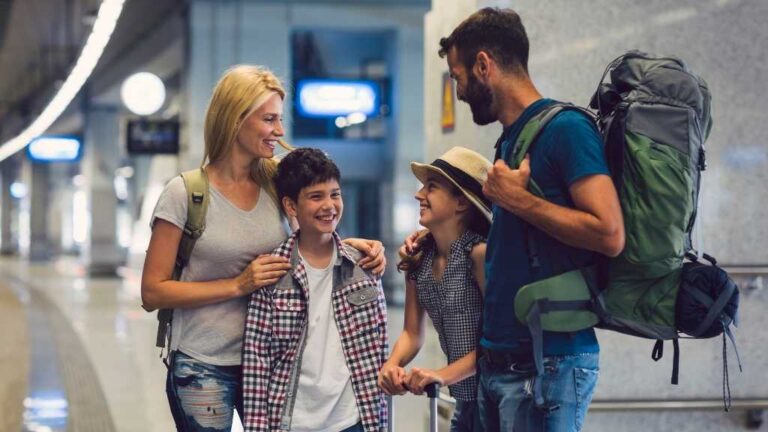Vacations and travel should be joyful experiences for everyone in the family, a time to create memories, rest, and recharge. Traveling is essential to life, and there is no reason to miss out on these experiences because of autism. However, traveling with autism requires prior preparation to make the trip easier and more enjoyable for everyone. Traveling with children on the spectrum can be challenging. Still, this is one of the many milestones families seek to achieve. At ABA Centers of Florida, we want to help you with these simple autism travel tips that will aid in preparation for a smoother travel experience.
For more information about ABA therapy with ABA Centers of Florida, click here.
6 Autism Travel Tips for Preparing Before You Go
The routine change, new noises, crowds, long lines, and security protocols are situations that can be overwhelming for a person with autism, which is why it is necessary to prepare before starting on a new adventure so that you can minimize discomfort during these experiences.
Choose your Flights Strategically
The number of people and noises at an airport are things you cannot control. Although, you can choose your flight time to attend the airport during the less busy hours, such as early morning flights. Try to select direct and shorter flights whenever possible.
Contact Costumers Services in Advance
You can request support at the airport and on the plane through airline customer service agents. Early boarding and seats in the front row are some of the support services offered by most airlines to help you reduce waiting time and keep your child from feeling cramped and crowded. Also, if there is a flight delay, ask the airline if they can give you access to VIP lounges with quieter environments.
On the other hand, there are some autism-friendly hotels worth exploring. These hotels offer support through inclusive environments designed especially for people with autism. You can contact guest services in advance to communicate your child’s needs and ask about their unique accommodation.
Finally, discussing safety precautions with the hotel staff is vital, especially if your child tends to wander from safety.
Explain the Expectations Through Educational Stories
Preparing your child with autism before a trip is critical. Visual aids such as a calendar to anticipate the day of the journey can help your child to look forward to the trip without worry. Likewise, familiarizing your kid with the possible situations they will experience during the trip, including the time at the airport and the flight, will help reduce the anxiety of this new experience.
A great way to teach your child about what to expect when traveling is through educational stories, which help explain a new social situation or behavior. Remember to include details about possible noises, different environments, and safety protocols.
Involve Your Child in the Process
Involving your child in the travel preparation helps to reduce their anxiety. One way to do this is to allow your kid to pack their backpack, where they can include their favorite calming toys, snacks, iPads, and other travel devices to help them entertain themselves during long waits.
Involving your child in the travel preparation gives them a sense of responsibility. Also, it allows them to select different choices of items that provide support and comfort in this new experience.
Address Any Possible Sensory Issues
Plan your child’s outfit previously. Avoid stiff pants, and opt for layers that you can easily remove, allowing you to adjust your kid’s clothes to the temperature of the airports and airplanes.
Also, remember to pack items that will help you cope with over-stimulating situations, such as earplugs, noise-cancellation headphones, dark glasses, music players, water, snacks, and an additional change of clothes.
Practice Using the Toilet
Before the flight, we recommend practicing visiting public restrooms to ensure that your child can use this skill in places different than home. As with all routines, ensure this is a friendly practice; you can implement positive behavior reinforcement by rewarding and complimenting your child. The goal is to generalize the habit of using the toilet in different environments, which usually does not happen spontaneously, and it is necessary to create opportunities to practice.
4 Essential Tips for Making Traveling with Autism Easier
Certain situations at airports can cause anxiety or stress for your child with autism, such as going through security checkpoints or using public restrooms. With these autism travel tips, you can prepare and face these situations calmly.
Reinforce Good Behavior
When traveling with your child with autism reinforcing good behaviors through special rewards helps to increase the likelihood of these positive behaviors in the future. Give a simple prize, such as a sticker or a small toy, when your kiddo demonstrates good behaviors that might be challenging, like sitting with the seat belt fastened, waiting patiently in line, and reading quietly.
Going Through Security
Going through security at airports can be one of the most challenging experiences for children with autism. In this case, it is crucial that before going through security checks, you have explained to your child this situation, the possible scenarios, and what people expect to ensure everybody’s safety.
It is also essential to inform the security personnel that your child has autism and ask for their assistance to help your child.
Plan Activities for the Waiting Times and During the Flight
As much as you want to have everything under control and think about every detail of your trip, there will be situations you can’t control (for example, flight delays), and that’s okay. If this happens, having activities to entertain your child will significantly help. Be sure to bring plenty of toys, snacks, and water. Some ideas might be coloring books, downloading their favorite movie or show, and taking walk breaks.
It is also essential to ensure you have enough water. Try to give your child a drink during take-off and landing to avoid clogging their ears and causing pain.
Create a Schedule
Although creating and maintaining a schedule on a trip is hard, especially if you have additional children, creating a program helps your child with autism develop a sense of routine during the trip, which helps to relieve anxiety. Try to set a schedule for breakfast, rest, and lunch.
How Can ABA Centers of Florida Support You?
The most important thing about traveling is to enjoy and create memorable moments. Through ABA therapy at ABA Centers of Florida, parents and children can gain tools to navigate complex situations, such as traveling. ABA therapy enhances attention, learning, and behaviors for successful outcomes allowing families experiencing neurodiversity to succeed in different life situations.
At ABA Centers of Florida, we understand that traveling and flying with autism is a challenge, but with the right tools and effort, it can be a good experience for the whole family. We know that caring for and ensuring the comfort of your child with autism is a task that requires commitment and support, and we are here to help. Contact us here or call us at 772-773-1975.








